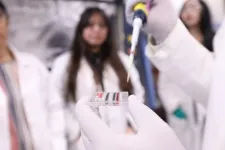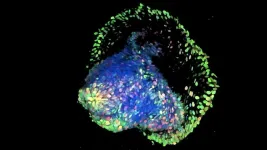(Press-News.org) Barcelona, Spain: Researchers have shown for the first time that it is possible for a specially-designed ‘mini-protein’ to deliver a radiation dose directly to tumour cells expressing a protein on their cell surfaces called Nectin-4, which is often found in a number of different cancers.
In a study presented on Friday at the 36th EORTC-NCI-AACR [1] Symposium on Molecular Targets and Cancer Therapeutics in Barcelona, Spain, Mike Sathekge, Professor and Head of the Nuclear Medicine Department at the University of Pretoria and Steve Biko Academic Hospital, South Africa, said he and his colleagues were able to show that the mini-protein, also known as a ‘radiopharmaceutical’, was able to target the cancer cells specifically, while avoiding healthy tissues, and that tumours in several different cancers absorbed the radiation dose.
“This is the first time we are seeing a completely new technology used for targeted radiation. A small protein made to seek out a different protein that many cancers express, Nectin-4, was used to take radiation directly to the tumour,” he said.
The mini-protein is called AKY-1189 and is the first compound designed to deliver a therapeutic dose of Actinium-225, a radioactive element, by specifically targeting Nectin-4. This is a protein found in cell membranes and is over-expressed in up to 90% of patients with various solid tumours, including bladder, breast, lung, head and neck, cervical and bowel cancers.
“We wanted to address the gap in care for patients whose cancer has grown beyond the part of the body it originated in or has spread to other parts of the body, and which had continued to progress on the local standard of care,” said Prof. Sathekge.
The researchers obtained permission for use of AKY-1189 under Section 21 under the South African Health Products Regulatory Authority (SAHPRA), and they imaged 20 patients at the Nuclear Medicine Research Infrastructure (NuMeRi), where Prof. Sathekge is president and CEO. Nine patients had metastatic bladder cancer, three had metastatic breast cancer, three had cervical cancer, two had colorectal cancer and three had non-small cell lung cancer.
They gave the patients a single injection of AKY-1189 (~5mCi of [68Ga]Ga-AKY-1189), which is the amount used in routine imaging of radiopharmaceuticals. They scanned the patients after one, two and three hours using positron emission tomography-computed tomography (PET-CT) to assess how well the drug had targeted the tumours and how much of the dose the tumours had absorbed.
In order to understand the dose over time (called ‘dosimetry’) that can be expected with [225Ac]Ac-AKY-1189 in tumours, organs, particularly the kidneys, and the whole body, the researchers injected AKY-1189 (10mCI [177Lu]Lu-AKY-1189) into nine patients and scanned them after three hours, 24 and 48 hours using SPECT-CT (single-photon emission computed tomography).
So far, 15 patients have been available for the researchers to analyse how the drug was distributed through the body and how much was taken up by the tumours. Eight patients could be assessed to see if any effect on the kidneys would be predicted when patients receive actinium ([225Ac]Ac-AKY-1189) in the future.
AKY-1189 did not have any adverse effects, including on the skin. The salivary glands showed a transient uptake that did not amount to any clinically meaningful exposure to radiation. The researchers found that there was some uptake of radiation in the kidneys, but at a level that suggests patients can safely receive a full course of [225Ac]Ac-AKY-1189 (six doses of ~8 MBq (megabequerels).
The imaging showed substantial tumour uptake of the radiation in several different cancers, while any radiation disappeared rapidly from normal tissues.
Prof. Sathekge said: “This was not a clinical trial and, therefore, we have not been able to collect data on cancer response to treatment yet, but those studies are now underway. However, we were able to gather important information not just for the specific patients, but also with respect to AKY-1189’s potential for future patients. The most important learning from our work here is that we can clearly see that the drug is taken up by different types of tumours and, as such, has great potential for treating those patients’ tumours. Also, and this is very important, we saw that the drug does not accumulate in normal tissue and so could be safe for multiple administrations to maximise treatment impact.
“These data lay the foundation for further clinical research with the drug in metastatic bladder cancer and other tumours that have the Nectin-4 target. We are opening a study at our institute at NuMeRi in Pretoria, South Africa, for patients with metastatic breast, lung, colorectal, cervical, and bladder cancer. The company that developed AKY-1189, Aktis, is also preparing their study in the USA.”
Professor Timothy A Yap from the University of Texas MD Anderson Cancer Center, Houston, USA, is co-chair of the EORTC-NCI-AACR Symposium and was not involved in the research. He said: “This interesting study shows that it is possible for a unique ‘mini-protein’, AKY-1189, to target Nectin-4, a protein expressed in a number of different cancers, such as bladder, breast, lung, head and neck, cervical and bowel cancers. The imaging results presented today show how it is able to home in specifically on Nectin-4 with the radiation having little or no effect in other, healthy cells. These are the first results for AKY-1189 in humans, and we look forward to hearing the results from the forthcoming clinical trials in due course.”
(ends)
Abstract no: 10, “AKY-1189, a novel, first-in-class miniprotein radiopharmaceutical designed to deliver Actinium-225 (225Ac) to Nectin-4 expressing tumors with broad therapeutic applications in metastatic urothelial carcinoma (mUC) and other Nectin-4 expressing tumors”, by Mike Sathekge, presented in the Proffered papers: new drugs on the horizon session, 12:00-13:30 hrs, Friday 25, October, Room 111+112.
[1] EORTC [European Organisation for Research and Treatment of Cancer, NCI [National Cancer Institute], AACR [American Association for Cancer Research]. The Symposium takes place in Barcelona from 23-25 October 2024.
END
New ‘mini-protein’ carries radiation dose directly to tumours without harming healthy tissues
2024-10-24
ELSE PRESS RELEASES FROM THIS DATE:
Patients with advanced bladder cancer with alterations in the FGFR3 gene respond well to investigational drug, TYRA-300
2024-10-24
Barcelona, Spain: Patients with advanced bladder cancer that had spread to other parts of the body (metastasised) have responded well in a phase I clinical trial of an investigational drug, TYRA-300. The drug targets changes in the FGFR3 gene that drive tumour growth in about 10%-20% of these patients.
Associate Professor, Ben Tran, a medical oncologist at Peter McCallum Cancer Centre in Melbourne, Australia, presented the first results as of 15 August 2024 from 41 patients enrolled in the SURF301 study in a late-breaking oral presentation at the 36th EORTC-NCI-AACR [1] Symposium on Molecular Targets and Cancer Therapeutics ...
Researchers find key genetic mutations in bowel cancer cells that lead to resistance to WRN inhibitors
2024-10-24
Barcelona, Spain: Researchers have discovered key mutations in certain cancer cells that make them resistant to WRN inhibitors, a new class of anti-cancer drugs. The yet-to-be-published findings are presented on Friday at the 36th EORTC-NCI-AACR [1] Symposium on Molecular Targets and Cancer Therapeutics in Barcelona, Spain.
Werner helicase (WRN) inhibitors are already being evaluated in phase I clinical trials in patients with tumours that have microsatellite instability (MSI) – a condition in which the genes responsible for monitoring and repairing mistakes in DNA replication stop functioning, and errors are introduced. This is also ...
Millions in the U.S. may rely on groundwater contaminated with PFAS for drinking water supplies
2024-10-24
PEMBROKE, N.H. — Approximately 71 to 95 million people in the Lower 48 states – more than 20% of the country’s population – may rely on groundwater that contains detectable concentrations of per- and polyfluoroalkyl substances, also known as PFAS, for their drinking water supplies. These findings are according to a U.S Geological Survey study published Oct. 24.
The predictive model results can help members of the public, water suppliers and regulators understand the potential for PFAS contamination, guide future studies and inform strategic planning for water resources.
USGS scientists are the first to ...
Human actions cause insect color change
2024-10-24
New Zealand’s native stoneflies have changed colour in response to human-driven environmental changes, new research shows.
Just published in the journal Science, the University of Otago study provides arguably the world’s most clear-cut case of animal evolution in response to change made by humans.
Co-author Professor Jon Waters, of the Department of Zoology, says the stonefly has become a different colour due to recent deforestation.
“In natural forested regions, a native species has evolved ‘warning’ colours that mimic those of a poisonous forest species, to trick predators into ...
New AI model could make power grids more reliable amid rising renewable energy use
2024-10-24
As renewable energy sources such as wind and solar become more widespread, managing the power grid has become increasingly complex. Researchers at the University of Virginia have developed an innovative solution: an artificial intelligence model that can address the uncertainties of renewable energy generation and electric vehicle demand, making power grids more reliable and efficient.
Multi-Fidelity Graph Neural Networks: A New AI Solution
The new model is based on multi-fidelity graph neural networks (GNNs), ...
Lurie Children’s helps train pediatricians to screen toddlers for mental health risk, with equity and ethics in mind
2024-10-24
One in five children has an identified mental health problem as early as age 3. Early detection is key to earlier intervention, and it also could prevent more severe conditions down the line, such as ADHD, depression and anxiety. Pediatric primary care is an ideal setting to conduct screening for mental health risk, given that pediatricians tend to have close, ongoing relationships with young patients and their families, and broad reach to historically marginalized communities. Since mental health screening of toddlers in primary care is uncommon, it is important to train pediatricians to do so without implicit bias and in a way that prevents unintended ...
UTEP researchers develop low-cost device that detects cancer in an hour
2024-10-24
EL PASO, Texas (Oct. 24, 2024) – Researchers at The University of Texas at El Paso have created a portable device that can detect colorectal and prostate cancer more cheaply and quickly than prevailing methods. The team believes the device may be especially helpful in developing countries, which experience higher cancer mortality rates due in part to barriers to medical diagnosis.
“Our new biochip device is low-cost — just a few dollars — and sensitive, which will make accurate disease diagnosis accessible to anyone, ...
Texas A&M physicist Kevin Kelly earns American Physical Society Early Career Award
2024-10-24
Dr. Kevin J. Kelly, an assistant professor in the Department of Physics and Astronomy at Texas A&M University and a member of the George P. and Cynthia Woods Mitchell Institute for Fundamental Physics and Astronomy, has been selected as the 2025 recipient of the American Physical Society’s Henry Primakoff Award for Early-Career Particle Physics in recognition of his contributions and promising career potential in fundamental particle physics and cosmology.
Kelly, who joined the Texas A&M faculty in 2022, works at the interface of two of the biggest outstanding mysteries in particle physics: ...
University of Maryland researcher awarded $1.8 million to study climate change’s impact on people with kidney disease
2024-10-24
Climate change is driving more extreme heat and more air pollution from wildfires, each of which put human health at risk. Now, new research funded by the federal Agency for Healthcare Research and Quality (AHRQ) and led by University of Maryland School of Public Health Professor Dr. Amir Sapkota, will study how these hazards independently and jointly impact already vulnerable groups, such as people living with end stage kidney disease (ESKD). The researchers aim to identify preventative solutions.
“During extreme heat, the damaged kidneys of people with ESKD do not regulate fluid levels very ...
Johns Hopkins Children’s Center research in mice suggests zinc supplements have potential value to directly treat short bowel syndrome
2024-10-24
Researchers from Johns Hopkins Children’s Center say they have identified a gene pathway involving the mineral zinc in mice that may someday point the way to using zinc-based supplements to directly help people with a rare disorder called short bowel syndrome (SBS).
The findings, published Oct. 7 in Nature Communications, help advance efforts toward more effective, potential treatment regimens for both children and adults with the debilitating condition.
SBS, which affects 10,000–20,000 adults and children in the United States, is marked by damage to and shortening of ...





